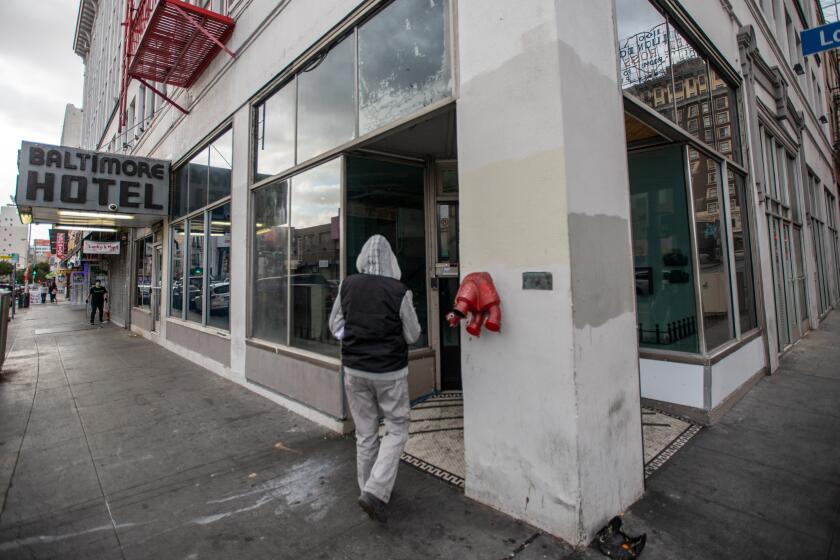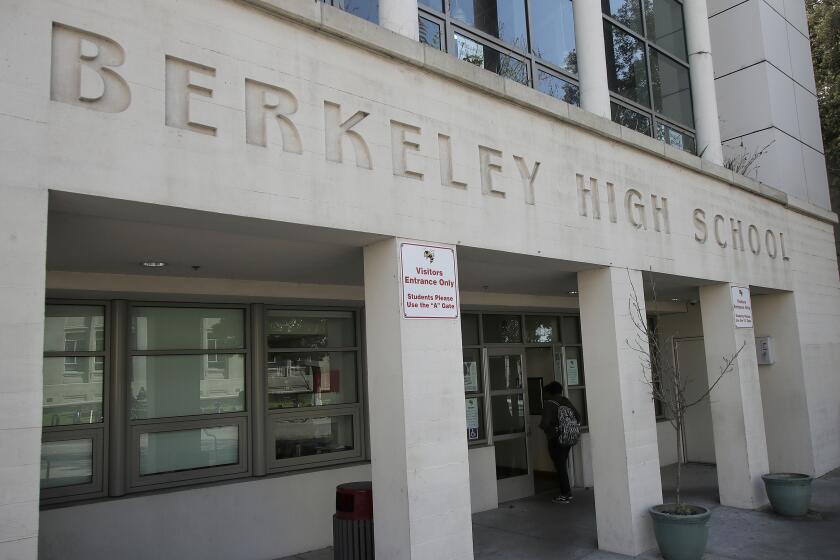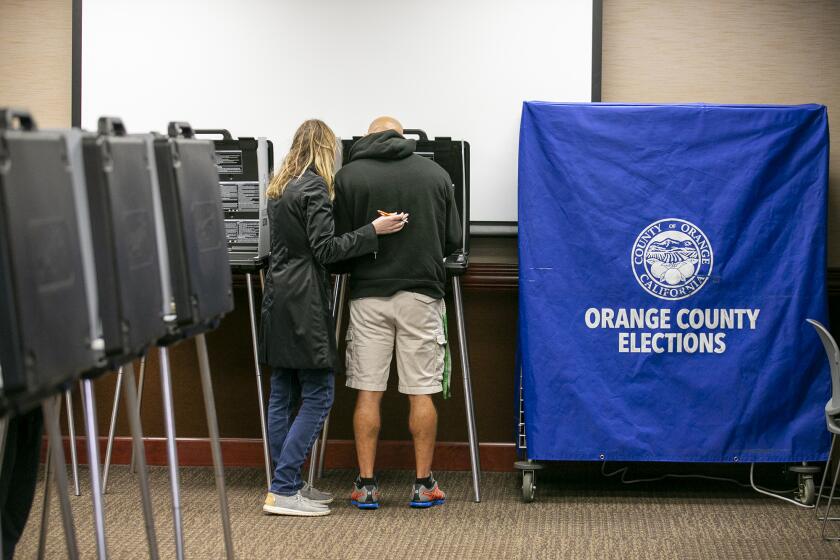Prisons Fail to Heal Healthcare
Nearly three years after California prison officials vowed to make major improvements in inmates’ medical care, the state is facing new criticism that many of its doctors are incompetent, leading to costly lawsuits and, at times, deaths.
Documents obtained by The Times show that one in five prison doctors has been disciplined by the California Medical Board or sued for malpractice -- a rate almost five times that found statewide.
Some physicians working behind bars have histories of criminal convictions, cocaine or alcohol addiction and a loss of privileges at hospitals, records show.
One doctor, now working at the state prison in Susanville, was treated for a psychotic disorder that prompted him to lead police on a chase through the streets of Fresno. He was ordered by the medical board to complete five years’ probation after a psychiatrist declared: “He cannot practice medicine safely.”
The disclosures are to be discussed by two state senators at a Capitol hearing today. Questions are also likely to surface about the June death of a Bay Area inmate whose family believes he was a victim of inept care.
Anthony Shumake, 41, died six days after a dentist under contract with a Vacaville prison extracted a wisdom tooth. An infection created an abscess and swelling in the neck, making it difficult for Shumake to breathe. A San Joaquin County coroner’s report said he died because the abscess constricted his airway.
Shumake’s family wants to know why he was driven to a hospital in Manteca -- a 75-mile ambulance ride -- rather than to a facility in Vacaville, where he was serving a 12-year term for spousal abuse and stalking. Corrections officials will not comment until an internal investigation is completed.
State Sen. Jackie Speier (D-Hillsborough) said Shumake’s death and statistics about doctors’ spotty records illustrate a system in crisis.
“It’s appalling,” said Speier, who has joined Sen. Gloria Romero (D-Los Angeles) in investigating the troubled prison system. “In addition to causing tragedies for inmates, this incompetence leads to lawsuits that cost taxpayers even more.”
Today’s hearing on medical care adds another dimension to what has been a difficult year for the youth and adult prison system. Despite new leadership and a governor who says he is committed to reforming corrections, the state has weathered allegations of inmate abuse, corruption and other scandals that have prompted a federal judge to threaten a takeover of California’s 32 adult prisons.
The disclosures about doctors come as healthcare costs are soaring. This year, the Department of Corrections will spend more than $900 million treating 164,000 convicts, accounting for 20% of the prison budget. Care is provided by 302 staff doctors, whose annual salaries average $177,000, as well as scores of physicians who work under contract with the state.
Corrections officials acknowledged that previous hiring practices failed to screen out some problem doctors, and that managers at each prison had their own, often inadequate standards.
“We really had various fiefdoms in the 32 institutions,” said Dr. Renee Kanan, acting chief of healthcare. Instead of seeking versatile physicians with a background in primary care medicine, managers hired doctors who simply met the state’s minimum qualifications, she said. But recently, “we’ve raised the bar,” she said. Now the state requires applicants to undergo thorough screening and a test of their abilities.
In addition, the department agreed last week to a court order that will subject every prison doctor to a rigorous evaluation by outside experts to determine whether they are competent. Physicians with minor shortcomings would be given remedial training, while those who fail could be fired. Kanan said she expects some doctors will flunk, but could not predict how many.
She would not provide a cost estimate, because negotiations are still underway with UC San Diego, the likely testing site. An aide to Speier, however, said the first phase of screening would cost at least $1.5 million, not counting any supplemental training.
The order for testing doctors was issued by U.S. District Judge Thelton Henderson. It was prompted by a July report from a team of medical experts who told Henderson that visits to half a dozen prisons revealed “an emerging pattern of inadequate and seriously deficient physician quality.”
Among other problems, the experts said, doctors were placed in positions for which they were not qualified. “Thus, an incompetent anesthesiologist or a retired neurosurgeon can be hired to see patients for diabetes or coronary heart disease, conditions that they have never been trained to treat,” the report said.
Henderson is overseeing the settlement of a 2001 lawsuit alleging that medical care in prisons was so poor that it amounted to cruel and unusual punishment. Under the settlement, the state agreed to phase in a new healthcare delivery system by 2008.
“We spend $1 billion each year on healthcare, and we still have people losing their lives,” Romero said. “We’ve been sued over and over again, but our remedies for this problem never seem to go far enough.”
Romero said figures showing that 20% of prison doctors had blemished records were unacceptable.
Among the most dramatic examples is Dr. Michael Reynolds, an obstetrician who has worked at Corcoran State Prison near Fresno -- a men’s institution -- since 2003.
Reynolds, a former alcoholic who once practiced in Irvine, was convicted in 1981 of possession of cocaine. He was placed on probation for three years and entered a substance abuse program, records show. Sued for malpractice at least seven times, he won one case and settled six, documents show.
In two of the cases, Reynolds left a surgical sponge in a woman’s abdomen, an oversight he said might have been influenced by a hangover, according to a 2001 deposition. In a third case, he paid more than $900,000 to a woman whose baby was born brain-damaged and a quadriplegic, allegedly because he waited too long to perform a caesarian section, the deposition said.
After Reynolds lost hospital privileges because of such episodes, the state medical board launched an investigation.
In 1996, the board concluded that Reynolds had committed gross negligence in two cases and placed him on seven years’ probation. The action banned him from practicing obstetrics and required him to be monitored by another physician. He also was ordered to undergo psychotherapy, drug screening and competency testing.
The state hired Reynolds in 2002, about 1 1/2 years before he completed probation. A department spokeswoman said he could not be reached for comment Tuesday.
Kanan said Reynolds joined the department when its hiring process was less selective, and that he would not “rank very high on the screening process now.” But she stressed that his record would not necessarily disqualify him, though it would prompt a vigorous discussion among prison physicians who evaluate applicants.
A second doctor whose past has raised red flags with legislators is Dr. Jeffrey Rohlfing, an orthopedic surgeon hired at High Desert State Prison in Susanville in mid-2003.
Rohlfing was placed on five years’ probation by the board, ending in 2002, after an investigation found him guilty of impairment due to mental illness and unprofessional conduct.
In 1996, board documents show, Rohlfing began engaging in “bizarre, irrational and delusional communications” with fellow staff members at a Fresno hospital. After one confrontation, police were summoned, prompting Rohlfing to flee in his car, running a red light before he was finally apprehended at his home. Police placed him on a 72-hour psychiatric hold.
After a second incident led police to again place him in custody for 72 hours, Rohlfing was examined by a psychiatrist, who found he was a danger to himself and others and could not practice medicine safely.
In an agreement with the board, Rohlfing kept his license but was subject to numerous conditions while on probation, including drug testing, psychiatric evaluation and monitoring by another physician.
Rohlfing was on vacation Tuesday and could not be reached for comment.
The president of a union for government doctors acknowledged that some who practice in prison “are deficient and probably would not have been hired if the state had proper credentialing committees.”
Dr. Robert Weinmann of the Union of American Physicians and Dentists added that a testing and retraining program was a fine idea -- for those who needed it.
“But,” he said, “what they are planning to do -- sending all the doctors, hundreds of them -- for testing is incredibly wasteful, insulting and reflective of the poor management that got the department into this mess in the first place.”
More to Read
Start your day right
Sign up for Essential California for news, features and recommendations from the L.A. Times and beyond in your inbox six days a week.
You may occasionally receive promotional content from the Los Angeles Times.






